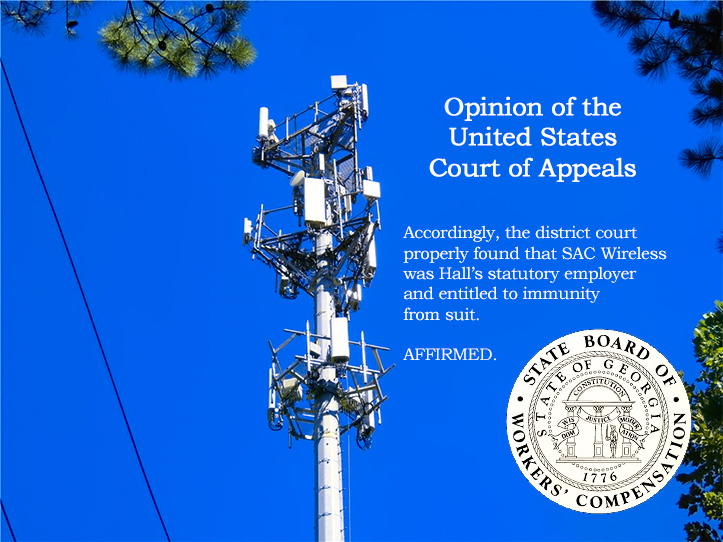
A crane oiler was assisting in removing a crane from this American Tower site in Georgia when the operator hit a power line, electrocuting the worker and causing a serious injury. He sued SAC Wireless for injuries, and SAC won a summary judgment. He then appealed it to the Eleventh Circuit, and a three-judge panel also agreed with the district court, citing that SAC had immunity based upon a Georgia workers’ compensation statutory employer provision.
The Eleventh Circuit, a federal court with appellate jurisdiction over the district courts in Alabama, Florida, and Georgia, on Wednesday, declined to renew a lawsuit against SAC Wireless LLC by a crane oiler who was electrocuted and seriously injured while helping remove a crane from an American Tower site in Georgia.
The court ruled that the worker was an employee of a subcontractor, not SAC Wireless, and SAC was immune from negligence under the state’s workers’ compensation act.
On August 20, 2020, a four-man SAC Wireless crew was installing five remote radio units and three new antennas and removing nine antennas during a T-Mobile upgrade on an American Tower Corp. 195-foot monopole off of Julliete Road in Stone Mountain when the tragedy occurred.
According to U.S. Northern District of Georgia Court documents, to safely complete the installation in an area surrounded by trees, SAC contracted with Maxim Crane Works, a nationwide rental company, for the use of a crane and an operator for four days.
On the final work day, crane oiler Antonio Hall arrived on site. When the crew no longer required Maxim’s services, the crane operator removed the stabilizer mats. At this point, Hall leaned against an outrigger as the operator’s chain for mats swung into a power line, causing the accident.
The high voltage reportedly exited his foot, causing serious damage that required a later partial amputation.
When the incident occurred, the tower crew immediately descended the monopole, rendered lifesaving assistance, and drove Hall out in a company truck on a dirt road to an awaiting ambulance.
Hall filed suit against SAC on November 24, 2021, asserting claims for negligence and punitive damages.
SAC’s initial answer to the complaint asserted multiple defenses, one stating that the case was through Maxim’s employees’ actions, non-actions, or negligence. If the lawsuit went to trial, SAC would likely identify that Maxim did not have one of their other two onsite employees spotting for the operator, which is a violation of the High Voltage Safety Act, a crucial detail in this case.
A key defense was SAC’s assertion that Hall’s claims were barred because the defendant was a statutory employer at the time of the incident.
The Georgia Workers Compensation Act (WCA) was designed to provide financial relief to injured employees such as Hall while protecting his employer from excessive damages recoveries.
The WCA’s ‘statutory employer’ provision also makes principal or intermediate contractors secondarily liable for workers’ compensation benefits for injured subcontractor employees, making them immune from tort actions.
The district court granted summary judgment in favor of SAC, ruling that the company was Hall’s statutory employer under the WCA. Hall appealed the decision.
The Eleventh Circuit reviewed the district court’s decision and addressed two main arguments from Hall.
Hall argued that he was not an employee of a subcontractor under the statute. The court found that the contract between SAC and Maxim established Maxim as a subcontractor providing both the crane and personnel, making SAC the principal contractor and Hall an employee of Maxim.
Hall contended that disassembling the crane was not part of the contract’s subject matter.
The court rejected this argument, stating that erecting, operating, and disassembling the crane were integral to SAC’s contract obligations.
Therefore, Hall’s duties in breaking down the crane fell within the scope of the contract.
The court emphasized SAC’s reliance on Maxim’s services, including personnel, to complete the antenna project. This reliance confirmed its status as Hall’s statutory employer. Consequently, SAC Wireless was entitled to immunity from Hall’s negligence claim under the WCA.
SAC admitted that “Had Maxim simply dropped off the crane at the project site for SAC’s exclusive use and had Mr. Hall been injured on the site while delivering the crane, then he would be able to credibly contend that Maxim was not acting as SAC’s subcontractor at the time of this accident.”
Hall argued that Maxim only provided tools. The court said that the argument lacks merit because if SAC Wireless only needed the crane, there would not be a contract for personnel to help use it.


















